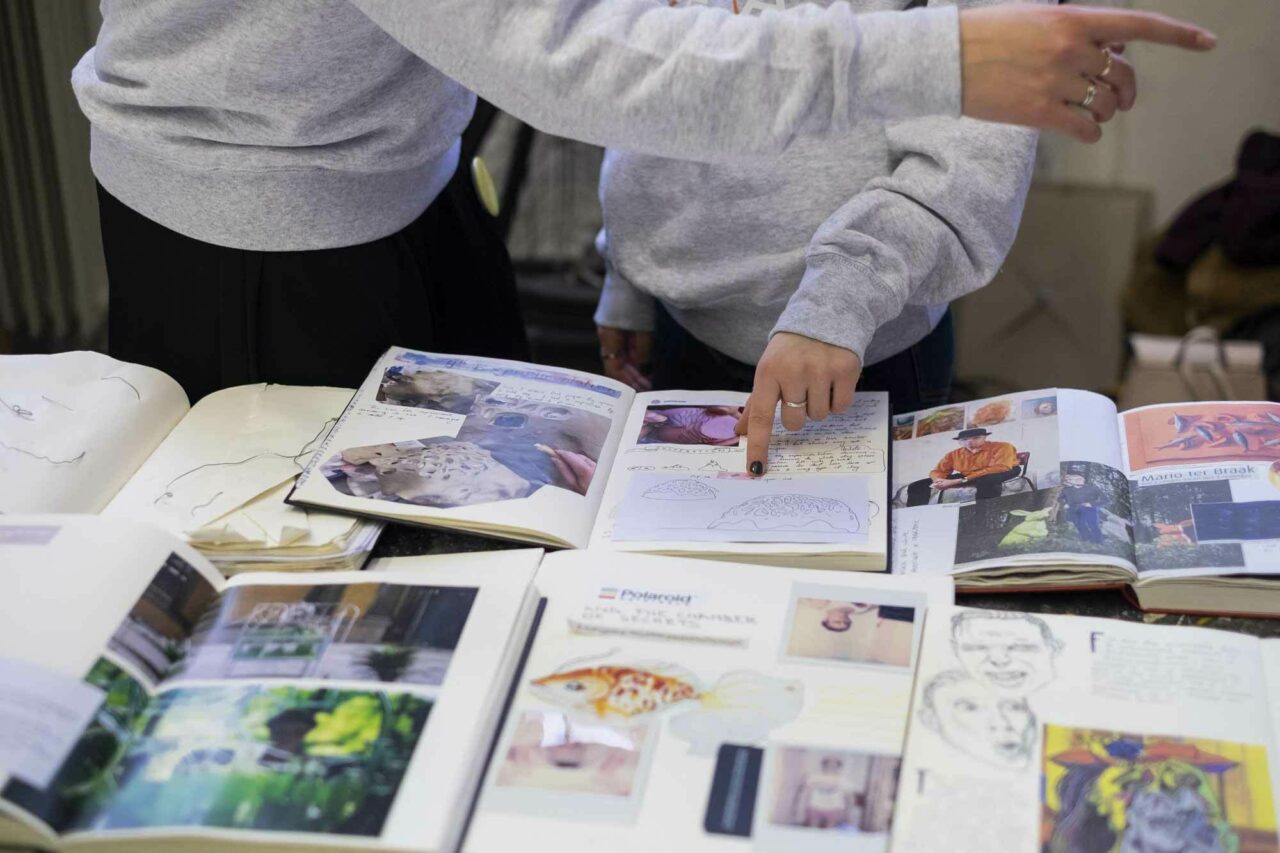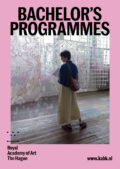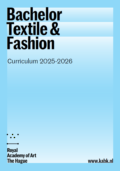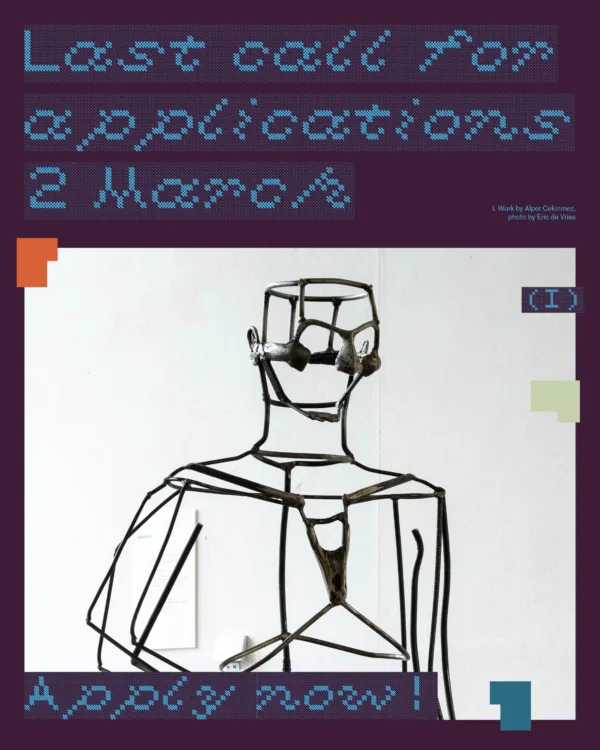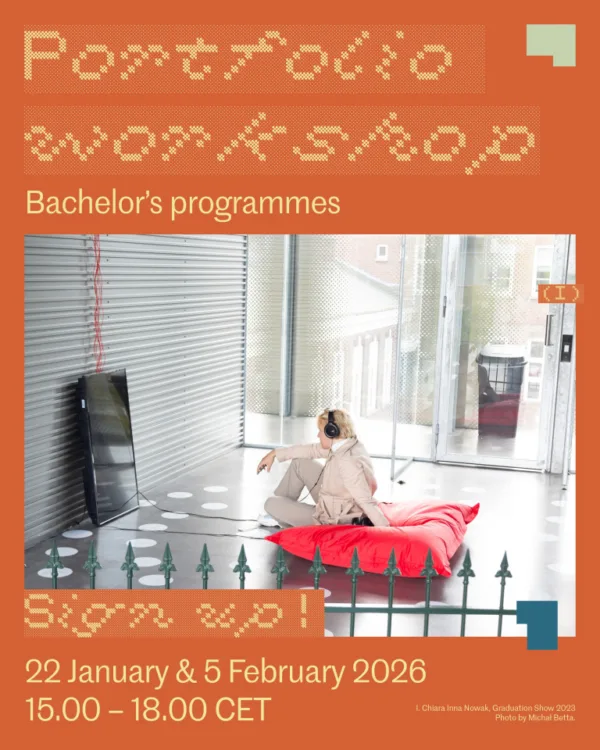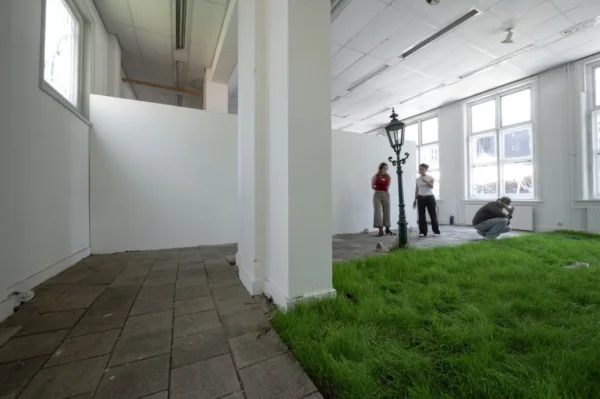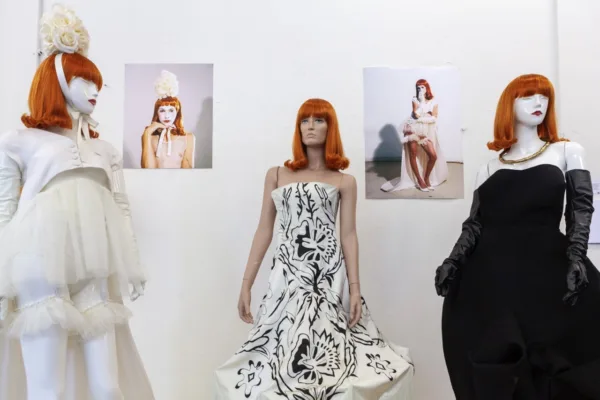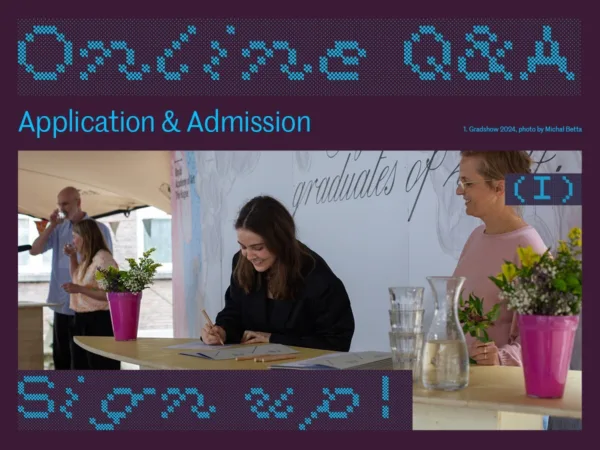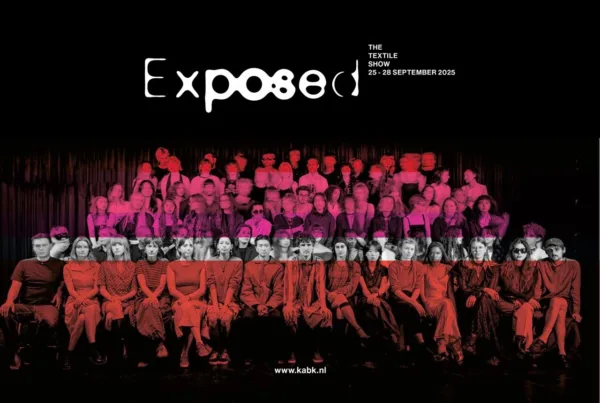Programme description
As a Textile & Fashion student, you engage with the ever-changing spirit of times: how it shapes our clothes, our surfaces, and the world around us. Since most of you are already aware of your desired trajectory, we ask you to choose for Textile or Fashion design before you start your educational journey. Textile and Fashion design students each have their own track, but there’s overlap in the programme, where both disciplines come together and collaborate.
In the first two years of the programme, you will get acquainted with a variety of design methods and skills. Working on several projects throughout the year will provide different experiences and opportunities to learn, and room for failure (in a positive way). We want you to be committed and ambitious about working on your projects but also experience that you are in school and aware that failure is optional and often part of growing.
The different projects will have their own focus, complementing each other on design methods, relevant topics, and skills. It will result in a broad range of opportunities and experiences over the first two years. We help you discover which way of working fits you best, what qualities and challenges you have to deal with and, in the end, what kind of designer you want to be(come).
Programme structure
Your first year is about experimentation and discovery. It is about breaking free from limitations and letting go of fixed ideas. You will be encouraged to push boundaries, embrace the unknown, and explore your creative voice. You will start developing your making skills, start dealing with creative processes, and learn about doing research both in theory and practice. Along the way you will become familiar with different aspects of creating a visual language, and you will take the first steps to discover and develop your own.
In the second year, the focus shifts to sharpening your skills and deepening your professional knowledge. You will explore craft techniques and study the historical, socio-economic, and cultural influences that shape textile and fashion today. The assignments will become more current, fed by social, cultural, and sustainable issues.
The balance of creativity and technical expertise helps you develop a more personal signature. Fashion students refine their skills in tailoring, (digital) pattern making, and draping. And the Textile students dive into specialist areas like couture embroidery, print design, bio-Textiles and semi-industrial weaving. Throughout the year, experienced professionals from the international fashion and textile industry provide guidance, sharing real-world insights and expertise.
Research plays a crucial role in understanding your work within a historical and contemporary context. It also helps cultivate an exploratory mindset, essential for any designer. You will have the opportunity to expand your horizons through the Individual Study Track (IST). This programme allows you to join cross-disciplinary projects across different departments, encouraging collaboration and innovation within KABK’s dynamic creative learning community.
For those looking to broaden their perspective, the second year offers a chance to study a semester abroad at one of KABK’s exchange partner institutions, an exciting opportunity to gain international experience.
In the third year, you will focus on developing your previously acquired skills further, to critically relate and communicate with the (professional) world around us. You learn to connect your knowledge and skills to what happens in the field of Textile and Fashion design, and you are challenged to engage yourself and become aware of your own (desired) position in the field of design.
During the third year, you are also preparing yourself for an internship in the fourth year. You will develop your skills in storytelling, presentation, and building in order to build a communicative portfolio that represents your past work and relates to your future ambitions.
In your fourth year, the focus shifts to developing and refining your personal vision as a designer. After finishing a 3-month internship in the Netherlands or abroad, you will start your graduation project that includes a “collection”, a thesis, and a final presentation. Together, these pieces will answer the important question: ‘What will I contribute to the world of tomorrow?’ and ‘How do I want my work to be seen?’.
Your graduation project should be a manifestation of your personal view on design and the world at large. You will use all your knowledge and skills to transform your design research into a relevant design project, showcasing who you are as a designer.
Right now, the Textile & Fashion industry is undergoing a critical transformation, with discussions around major themes like sustainability, pollution, and change. As a young designer, it’s essential to be aware and take a stance on these issues and communicate your ideas effectively to your audience.
You are challenged to collaborate with professionals from other fields such as photography, graphic design, styling, exhibition design, and PR, allowing you to expand your creative network, since collaboration is at the heart of most creative projects.
All graduation projects will be featured in the academy’s Graduation Show, which attracts around 7,000 visitors each year, and will be showcased during ‘EXPOSED’, our annual departmental event where students from all years present their work. This includes the fashion show in June, and the Textile exhibition in September.
Courses & ECTS credits 2025-2026 - Specialisation Textile
| Courses Semester 1 | ECTS |
|---|---|
| Design - Textile | 8 |
| Skills - Textile - Weaving & TC2 - Knitting - Print and Pattern | 8 |
| Visual Communication
- Model Drawing | 7 |
| Applied Research
- Textile & Fashion Theory | 4 |
| Common Ground | 3 |
| Total | 30 |
| Courses Semester 2 | ECTS |
|---|---|
| Design - Textile | 8 |
| Skills - Textile - Weaving & TC2 - Knitting - Print and Pattern | 8 |
| Visual Communication
- Model Drawing | 7 |
| Applied Research
- Textile & Fashion Theory | 4 |
| Common Ground | 3 |
| Total | 30 |
| Courses Semester 1 | ECTS |
|---|---|
| Design - Textile | 7 |
| Skills - Textile - Weaving & TC2 - Print and Pattern - Embroidery | 7 |
| Visual Communication
- Model Drawing | 6 |
| Applied Research
- Textile & Fashion Theory | 4 |
| Common Ground LABS | 6 |
| Total | 30 |
| Courses Semester 2 | ECTS |
|---|---|
| Design - Textile | 7 |
| Skills - Textile - Weaving & TC2 - Knitting - Print and Pattern - Embroidery | 7 |
| Visual Communication
- Model Drawing | 6 |
| Applied Research
- Textile & Fashion Theory | 4 |
| Common Ground LABS | 6 |
| Total | 30 |
| Courses Semester 1 | ECTS |
|---|---|
| Design - Textile | 7 |
| Skills - Textile - Knitting - Print and Pattern - Embroidery | 6 |
| Visual Communication
- Model Drawing | 7 |
| Applied Research
- Textile & Fashion in Context | 4 |
| Individual Study Track (IST) | 6 |
| Total | 30 |
| Courses Semester 2 | ECTS |
|---|---|
| Design - Textile | 7 |
| Skills - Textile - Weaving & TC2 - Print and Pattern | 6 |
| Visual Communication
- Model Drawing | 7 |
| Applied Research
- Textile & Fashion in Context | 4 |
| Individual Study Track (IST) | 6 |
| Total | 30 |
Courses Semester 1 | ECTS |
|---|---|
| Design - Textile - Graduation Project | 8 |
| Applied Research
- Thesis | 22 |
| Total | 30 |
| Courses Semester 2 | ECTS |
|---|---|
| Design - Textile - Graduation Project | 26 |
| Applied Research
- Thesis | 4 |
| Total | 30 |
Courses & ECTS credits 2025-2026 - Specialisation Fashion
| Courses Semester 1 | ECTS |
|---|---|
| Design - Fashion
- Fashion Design | 8 |
| Skills - Fashion - Product Development - Textile Development | 8 |
| Visual Communication
- Model Drawing | 7 |
| Applied Research
- Textile & Fashion Theory | 4 |
| Common Ground | 3 |
| Total | 30 |
| Courses Semester 2 | ECTS |
|---|---|
| Design - Fashion
- Fashion Design | 8 |
| Skills - Fashion - Product Development - Textile Development | 8 |
| Visual Communication
- Model Drawing | 7 |
| Applied Research
- Textile & Fashion Theory | 4 |
| Common Ground | 3 |
| Total | 30 |
| Courses Semester 1 | ECTS |
|---|---|
| Design - Fashion
- Fashion Design | 6 |
| Skills - Fashion - Product Development | 7 |
| Visual Communication
- Model Drawing | 7 |
| Applied Research
- Textile & Fashion Theory | 4 |
| Common Ground LABS | 6 |
Total | 30 |
| Courses Semester 2 | ECTS |
|---|---|
| Design - Fashion
- Fashion Design | 6 |
| Skills - Fashion - Product Development | 7 |
| Visual Communication
- Model Drawing | 7 |
| Applied Research
- Textile & Fashion Theory | 4 |
| Common Ground LABS | 6 |
Total | 30 |
| Courses Semester 1 | ECTS |
|---|---|
| Design - Fashion
- Fashion Design | 6 |
| Skills - Fashion - Product Development | 8 |
| Visual Communication
- Model Drawing | 6 |
| Applied Research
- Textile & Fashion in Context | 4 |
| Individual Study Track (IST) | 6 |
| Total | 30 |
| Courses Semester 2 | ECTS |
|---|---|
| Design - Fashion
- Fashion Design | 6 |
| Skills - Fashion - Product Development | 8 |
| Visual Communication
- Model Drawing | 6 |
| Applied Research
- Textile & Fashion in Context | 4 |
| Individual Study Track (IST) | 6 |
Total | 30 |
| Courses Semester 1 | ECTS |
|---|---|
| Design - Fashion - Graduation Project | 8 |
| Applied Research
- Thesis | 22 |
Total | 30 |
| Courses Semester 2 | ECTS |
|---|---|
Design - Fashion - Graduation Project | 26 |
| Applied Research
- Thesis | 4 |
| Total | 30 |
Final qualifications
The final qualifications have been summarised in seven competencies. The KABK has established these competencies according to the national final qualifications for Educational Profiles for Fine Art and Design programmes.
Graduates are expected to meet the following final qualifications:
You are able to develop an innovative concept and elaborate this into a unique and significant image, collection of products, means of communication or spatial design, and you are able to put this into a context in an innovative manner.
You are able to observe, analyse, explain and evaluate your own work and that of others, and you are able to use the results of this to the advantage of your own work.
You are able to further develop your views, capacities, work and way of working in a way that suits your character and relates to your discipline.
You are able to set up and maintain an inspiring and professional working environment.
You are able to present and explain your ideas, concepts, work, methods, and artistic vision to professionals and other interested parties.
You have a vision about the role and position of your discipline within society, and you can relate your work and understandings to those of others and to continuously developing cultural and societal developments.
Students can direct cooperative efforts and give content to them.
OER 2025-2026
Education and Examination Regulations
You can find information about the regulations and provisions dealing with the organisation of the programme and the assessments and examinations related to it in the Education and Examination Regulations (in Dutch: Onderwijs- en examenregeling; OER)
